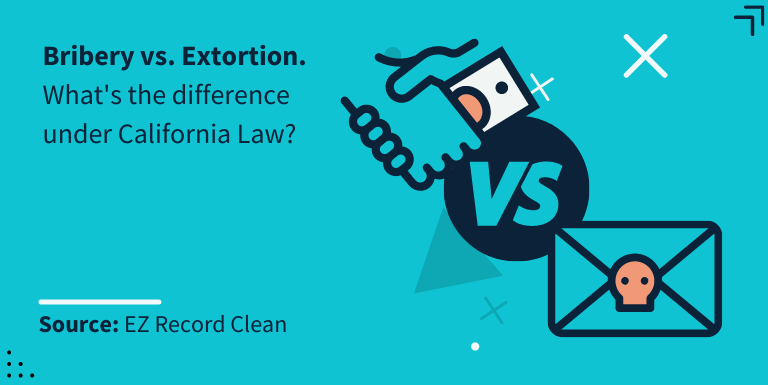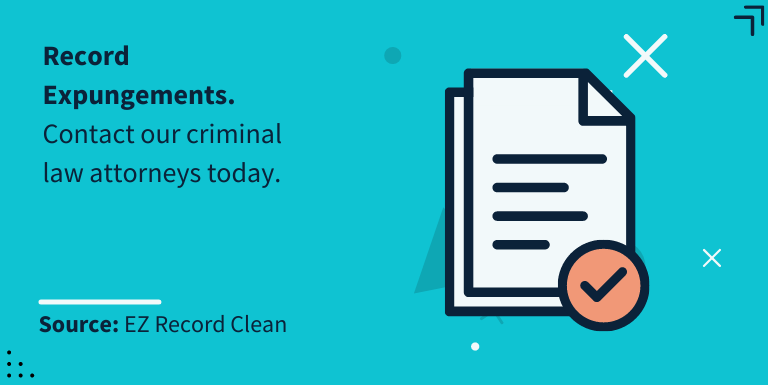Quick Summary: The difference between bribery and extortion is that bribery is when someone accepts money or something of value in exchange for performing an act to benefit the person who gave it. Extortion, on the other hand, is when a person threatens harm to another unless they receive something from them.
Table of Contents:
- The Definition of Bribery
- The Definition of Extortion
- The Difference Between Bribery and Extortion
- Examples
- Related Offenses
- Record Expungements
Bribery and extortion are two crimes that may seem similar at first glance, but there is a major difference between the two. This article will discuss the differences between these two crimes under California law so that you can better understand how each crime applies to different situations.
The Definition of Bribery
Bribery1 involves giving someone money or something else of value in order to influence them to do something illegal or unethical. California law defines bribery as:
- offering, giving, or taking something of value,
- with corrupt intent
- in order to influence a person in public or official capacity
Corrupt intent is defined as wrongfully gaining a financial or another kind of advantage for yourself or someone else. If you offer money to a police officer to deter a speeding ticket, you commit bribery and can be prosecuted.
Keep in mind that bribery laws apply to both sides of the transaction. A person who offered the bribe and the person who accepted the bribe are both guilty.
Additionally, it doesn’t matter if the transaction actually went through. Merely thinking about bribing someone and acting on that thought is still considered bribery under California Law.
All bribery offenses except for commercial bribery are considered felonies. If convicted of felony bribery, you face imprisonment for up to 4 years and formal probation.
The Definition of Extortion
Under Penal Code 518, extortion2 is when someone threatens you with some kind of harm if they don’t get what they want from you. Sometimes referred to as blackmail, extortion is a person using force or threats to compel another person to do something.
(a) Extortion is the obtaining of property or other consideration from another, with his or her consent, or the obtaining of an official act of a public officer, induced by a wrongful use of force or fear, or under color of official right.
(b) For purposes of this chapter, “consideration” means anything of value, including sexual conduct as defined in subdivision (b) of Section 311.3, or an image of an intimate body part as defined in subparagraph (C) of paragraph (4) of subdivision (j) of Section 647.
This could include compelling:
- someone to hand over money
- someone to give up property
- a public officer to perform an official act
Extortion is a felony offense that is punishable by custody for up to 4 years in state prison and the possibility of a max fine of $10,000. You may also be granted formal probation in lieu of prison time.
In addition to the prison time and fines, any violent felony is considered a strike under California’s Three Strikes Law. This law increases the punishments for multiple-time offenders. So, if this is your second or third violent felony offense, you could be charged with enhanced penalties.

The Difference Between Bribery and Extortion
These definitions seem very similar but there is one major difference. The difference between bribery and extortion is bribery does not include force or threats.
With bribery, both parties can be found guilty because they are both voluntarily partaking in the crime. In contrast, with extortion, one party is forcing the other party to act against their will.
Common threats used in extortion offenses include:
- threatening to release a celebrity’s address and contact information
- threatening to release sexually explicit photos or messages
- threatening to injure or kill another person
As far as penalties for bribery and extortion offenses, there are a couple of differences. They both have state prison sentences but only extortion comes with a fine.
Also, bribery is not a strike law under California’s Three Strikes Law. This means that you will not receive enhanced penalties if this isn’t your first conviction.
Examples
Below are some examples of bribery and extortion offenses.
- A public official who receives payment for making an official act is guilty of bribery. In addition, the person paying him is also guilty.
- Attempting to pay a witness money so that they don’t testify against you in court is considered bribery and could land you in prison.
- A sporting official who accepts money for the promise of “fixing” a sporting event is guilty of bribery and will be punished.
- Threatening to post your ex’s nude photographs online if they don’t unblock your phone number is a form of extortion.
- Hacking into a company’s bank records and financial details and threatening to expose this information publicly unless the company pays a ransom is considered extortion.
- Telling someone who you are in a relationship with taht you will accuse them of rape after learning that they cheated on you unless they pay you money is an extortion offense.
Related Offenses
There are various laws that are related to California bribery and extortion offenses. Depending on the circumstances of the case, you may be charged with the following convictions along with your bribery or extortion charges. Read below to see if you might be prosecuted under additional statutes as well.
Eavesdropping – PC 632
Eavesdropping is defined under California Law as unlawfully listening to or recording confidential communication without the consent of all parties involved. This crime is a wobbler offense punishable by imprisonment in county jail for up to a year or state prison for up to 3 years. In both cases, you can also be charged a fine of up to $2,500.
While eavesdropping is a separate offense, it can be charged along with bribery or extortion. For example, let’s say you listen in one someone’s private conversation without them knowing. Then, you use the information that you heard in that conversation to blackmail them into doing something for you. This can be charged under PC 518 and PC 632.
Embezzlement – PC 503
Under Penal Code 503, Embezzlement is when someone unlawfully takes property that has been entrusted to him/her from the rightful owner of the property. This law includes the intent to deprive the rightful owner of the use of the property taken.
Although similar, embezzlement is different from bribery in that bribery includes a corrupt intent and embezzlement includes an intent to deprive. This offense is punishable by up to 3 years in state prison.
Robbery – PC 211
California Penal Code 211 defines robbery as unlawfully taking personal property from someone else by using force or fear. This is similar to extortion but there is a major difference. Extortion involves the victim consenting to a taking of money or property. Whether this is through fear or not, they still consented, making it extortion.
However, if they never consented and you took the property anyway, it is considered a robbery.
Theft by False Pretenses – PC 532
PC 532 Theft by False Pretenses, also known as California’s Fraud Statute, criminalizes defrauding someone of money or property through false promises or representations. This is a wobbler offense that is punishable by up to 3 years in jail or state prison.
This is similar to bribery because both parties are consenting to the unlawful transfer of goods or services.

Record Expungements
If you have a bribery conviction on your criminal record, it is possible for the charge to be expunged. This will remove it from public records so that potential employers and landlords can’t see it in the future.
However, if you’re looking to get an extortion charge expunged from your record, you are not eligible. Once convicted of extortion, even with successful completion of probation and parole time in full without any other offenses, this crime cannot be taken off your record.
It can, however, be reduced to a felony. Although still on your record, a misdemeanor doesn’t carry the same legal weight as a felony.
Expunging a bribery conviction or reducing a felony extortion charge can completely change your life. This will make it easier to get a job and rent a home. Contact our criminal law attorneys today to get your criminal record expunged.
Footnotes
- Bribery – See Penal Codes 92, 93, 94, 94.5, 95, 95.1, 95.2, 95.3, 96, 96.5, 98, 99, 100
- Extortion – See Penal Code 518, 520, 521, 522, 523, 524, 525, 526, 527
